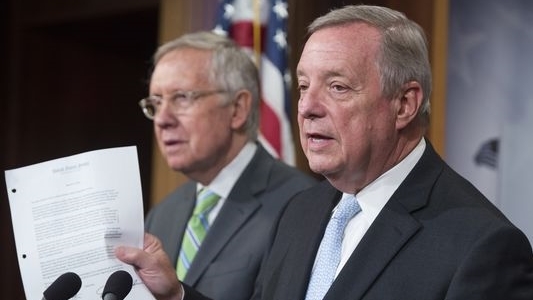Congressional Dispatches: Senate Dems block GOP measure to thwart nuclear deal; House deliberates JCPOA
/
By Ceena Modarres, AIC Research Associate
After over six hours of debate, the U.S. Senate blocked a cloture motion (S.625) on a disapproval resolution concerning the Joint Comprehensive Plan of Action (JCPOA). The final count was 58 votes to advance the resolution and 42 against. As a result, opponents of the nuclear agreement failed to advance a resolution that would disapprove of the nuclear agreement.
The debate and vote on the cloture motion was largely partisan. All but four Democrats voted against and every Republican voted for cloture.
After the result, the conversation on the Senate floor quickly turned into a vicious back and forth between Senate Minority Leader Harry Reid (D-NV) and Senate Majority Leader Mitch McConnell (R-KY). Mr. McConnell criticized the Democrats and stated: “We’ll have another opportunity [next week] to see if we can move past this procedural device.”
Mr. Reid immediately responded: “There should be no doubts that the U.S. Congress will allow this deal to succeed. Any future attempts to relitigate this issue in the Senate will be met with the same outcome… This matter is over with.” Senate Foreign Relations Committee member Tim Kaine (D-VA) supported Mr. Reid: “As we worked on the review act, everyone understood there would need to be 60 votes to pass a motion of disapproval or approval.”
However, Senator McConnell was not entirely incorrect in stating that Capitol Hill’s role in the future of this nuclear deal is far from over. While the debate raged on the Senate floor, the U.S. House of Representatives considered three bills: first, a resolution that would effectively restart the mandated 60-day limit on congressional review by stating that President Obama did not provide necessary documentation on the Iran nuclear agreement’s “side deals” (H.R. 412); second, a measure that approves or denies the deal itself (H.R. 3461); third, a bill that waives President Obama’s ability to remove sanctions for the remainder of his time in office (H.R. 3460).
The House passed the resolution that the president has not disclosed the relevant information on the side deals between Iran and the International Atomic Energy Agency on previous possible military dimensions of its nuclear program. The other two bills are scheduled for a vote tomorrow. However, the 42 votes supporting the nuclear deal in the Senate will, in all likelihood, prevent any further motion on these bills.
A day after it was reported that Ayatollah Ali Khamenei stated Israel wouldn’t exist in 25 years, many members of Congress chose to emphasize Iranian hostility towards Israel and the chants of “death to America.”
Much of the rest of the debate in both congressional bodies involved the same back-and-forth that has become routine over the last few months.
House Foreign Affairs Committee Chair Ed Royce [R-CA] began the debate over the measure approving or rejecting the Iran nuclear agreement by hammering the U.S. negotiators for “settling for managed access. It will take 24 days to commence the [inspection] process.”
House Minority Leader Nancy Pelosi [D-CA] repeatedly referred to the JCPOA as an “extraordinary accord.” Ms. Pelosi cited former National Security Advisor Brent Scowcroft’s op-ed and UK Prime Minister David Cameron, French President François Hollande, and German Chancellor Angela Merkel’s op-ed in the Washington Post that labeled the nuclear agreement an “epochal moment that the Congress shouldn’t squander” and an “agreement that provides the foundation for resolving the conflict on Iran’s nuclear program permanently.”
In the Senate debate, Senator Marco Rubio [R-FL] warned that “we are making a terrible mistake” and Tom Cotton [R-AR] provided his own dramatic opposition to the nuclear agreement. Mr. Cotton stated: “If Iran goes nuclear, history will not remember kindly the senators who approved this deal.”
With only one week left until the clock on Congressional review expires, a predetermined result isn’t preventing any excitement.

